| Srl | Item |
| 1 |
ID:
156180
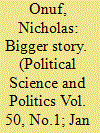

|
|
|
| 2 |
ID:
154039
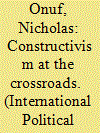

|
|
|
|
|
| Summary/Abstract |
In this paper, I ask why constructivism in IR has slowed down as a theoretical project. One answer is that slowing down is normal (as in normal science); there is no problem. I propose a second answer, to the effect that constructivism has reached a crossroads. As the way ahead gets slower and slower, the temptation to turn off the road can only strengthen. The slowdown and the crossroads point to a central feature of constructivist thinking. As constructivists, we do systematically what ordinary people do routinely—we furnish our world with moderate-sized dry goods. By now we have plenty of furniture; there must be something else we can or should be doing.
|
|
|
|
|
|
|
|
|
|
|
|
|
|
|
|
| 3 |
ID:
047348
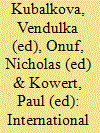

|
|
|
|
|
| Publication |
Armonk, M. E. Sharpe, 1998.
|
| Description |
xiii, 214p.
|
| Standard Number |
0765602970
|
|
|
|
|
|
|
|
|
|
|
|
Copies: C:1/I:0,R:0,Q:0
Circulation
| Accession# | Call# | Current Location | Status | Policy | Location |
| 044835 | 327/KUB 044835 | Main | On Shelf | General | |
|
|
|
|
| 4 |
ID:
118166
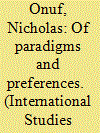

|
|
|
| 5 |
ID:
096064
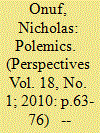

|
|
|
| 6 |
ID:
121856
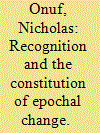

|
|
|
|
|
| Publication |
2013.
|
| Summary/Abstract |
For two decades, political theorists have granted recognition a great deal of attention. However, theorists of international relations have not, despite a common interest in identity politics. Instead, the latter take recognition for granted as a long-standing practice enabling states to engage in relations, as equals, under law. I hold that recognition is an unexplored way of addressing the constitution of epochal change in the modern world. I develop this claim first by reviewing what political theorists say about recognition. Not sharing their preoccupation with identity, I also draw on a secondary but still important theme in this literature - recognition's relation to justice. I then turn to the relations of states to show how international society has always exemplified the very processes of recognition that political theorists would like to find within their late modern societies. I conclude with some comments on the enduring properties of international society.
|
|
|
|
|
|
|
|
|
|
|
|
|
|
|
|
| 7 |
ID:
090143
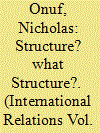

|
|
|
|
|
| Publication |
2009.
|
| Summary/Abstract |
Kenneth Waltz is a structural theorist. While scholars often comment on Waltz's conception of structure, they rarely address the philosophical assumptions behind it - assumptions that go back to Kant and finally to Aristotle. Appropriately situated, Waltz's conception of structure points to a strong version of constructivist social theory. To make my case, I trace Waltz's view of political structure in his early work, recapitulate his views on science, models and theory, address the question of his (or any) theory's relation to `reality', illustrate his difficulty with structural theory and institutional reality, and consider the vexed question of any theory's fit to a world already talked into existence. I show how close Waltz is to a philosophical position that solves his problem with theory's relation to reality and specifies the conditions under which any social theory can make sense or use of the term structure.
|
|
|
|
|
|
|
|
|
|
|
|
|
|
|
|